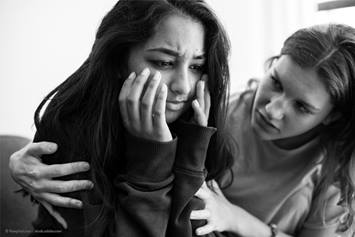Sexual Abuse
Sexual abuse is any act of a sexual nature upon a child.
What Is Sexual Abuse?
Sexual abuse can include both touching and non-touching behaviors.
Researchers estimate that about one out of six boys and one out of four girls have been sexually abused.
Children respond to sexual abuse in many different ways. It can depend on their age, gender, personality and family circumstances.
If a child says they have been abused, the first thing to remember is to try to stay calm. You may need to reassure the child that what happened is not their fault, and that you believe them. Take your child to see a mental health and/or medical professional. The Center for Family Safety and Healing can help.
What Symptoms Should You Look For?
Child sexual abuse can be hard to detect. The abuse often occurs in secret, and there is often not physical proof.
Common symptoms of sexual abuse in children and adolescents include:
Mental Health Problems
- Post-traumatic stress disorder (PTSD)
- Anxiety
- Depression
- Fear
- Emotion dysregulation
- Somatic complaints and nightmares
- Thoughts of suicide
- Habit disorders (biting, rocking)
- Extreme fear of being touched
- Unwillingness to submit to physical examination
Sexualized Behavior
- Sexualized play with dolls
- Excessive or public masturbation
- Requesting sexual stimulation from adults or other children
- Age-inappropriate sexual knowledge
Behavioral Problems
- Withdrawal and mistrust of adults
- Aggression
- Behavioral problems in school
- Delinquency
- Regressive behavior (including incontinence, tantrums, and whining)
- Running away
- Self harm
It is important to note that these behaviors do not definitively mean a child has been sexually abused. Additionally, some sexual curiosity is a typical part of normal development. You should ask your child’s pediatrician or mental health provider if you are concerned. Physicians and mental health professionals are legally obligated to report all suspected cases of abuse or neglect to state authorities.
Why Don’t Children Tell About Sexual Abuse?
There are many reasons why children don’t want to “tell on” their abusers:
- Fear that their parents/caregivers will be mad at or blame them.
- The child does not want to get the abuser into trouble.
- The fear of being removed from the home.
- A belief that the sexual abuse is “okay” or acceptable.
- The fear of not being believed.
- Shame or guilt.
- The belief that they deserved the sexual abuse for their behavior.
What Are the Risks if Sexual Abuse Goes Untreated?
If the trauma from sexual abuse goes untreated, the symptoms can continue into adulthood, including:
- Lingering PTSD and anxiety
- Depression and thoughts of suicide
- Sexual functioning concerns
- Difficulty setting safe limits with others (e.g., saying no to people)
- Relationship problems
- Poor body image and low self-esteem
- Unhealthy behaviors such as alcohol use, drug use, self-harm, suicidal behaviors or eating problems
Many of these behaviors can be attempts to hide painful emotions related to the abuse. The long term effects are often compounded by secrecy, fear and denial. The severe consequences of childhood sexual abuse confirm the need for early intervention.
How Is Sexual Abuse in Children Treated?
Children can and do recover from sexual abuse. That's why it is crucial for victims of sexual abuse to receive counseling to decrease or prevent the symptoms of sexual abuse trauma.
One of the most effective treatments for children with sexual abuse trauma is trauma-focused cognitive-behavioral therapy (TF-CBT). In this therapy, children learn age-appropriate information about abuse, develop skills to manage their symptoms, and challenge unhelpful beliefs they may have developed due to the abuse. Children are also encouraged to talk about their memories of the traumatic experiences in a gradual manner to reduce the power that these memories hold. Caregivers are ideally involved throughout this therapy. The overall goal of TF-CBT is to increase functioning and reduce further risks for victimization.
Other therapies have shown to be effective. Some therapies focus specifically on processing the trauma, while others focus on managing other behaviors prior to working on trauma. For example, therapies that build a supportive relationship with a safe adult, help children learn to manage intense emotions, or directly address issues of safety (like suicidal thoughts or self-harm) are often recommended for children with trauma histories.
Overall, when feelings tied to the trauma are explored, those feelings tend to become less powerful and their behavior becomes easier to manage. With professional guidance and parental understanding, children can regain a sense of safety and self-control.



